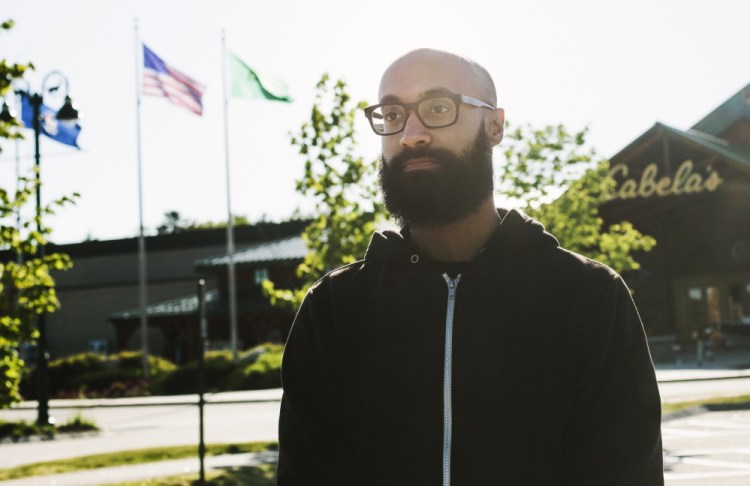Take a deep breath, Mainers.
Making it easier for people to pack heat isn’t going to lead to rampant vigilantism and rolling gun battles. That’s the word from those who have seen gun-control laws relaxed elsewhere.
Not that people like Micah Davis of Scarborough need such reassurance. The 30-year-old doesn’t own a gun but is considering getting one for home protection. He said legislation that would make Maine the seventh state to allow residents to carry concealed handguns without a permit won’t affect his decision.
“I feel like I’m an upstanding citizen,” Davis said. “I feel like you should probably arm the people I trust. I know the people I don’t trust are carrying.”
Nor does Davis intend to alter his behavior when out in public, where some may fear that a routine disagreement over a parking space could escalate into a dangerous situation if either party is now more likely to be armed.
“People are carrying that aren’t supposed to be anyway, so just be nice in general,” is Davis’ advice.
Maine already has issued tens of thousands of concealed-carry permits.
The bill would let gun owners bypass that process in keeping with what proponents call their “constitutional carry” rights. Opponents worry about dropping the requirement that handgun carriers pass a safety course, among other stipulations. The measure has been approved in both the House and Senate, but awaits consideration by the Appropriations and Financial Affairs Committee before final passage.
Experiences in other states indicate that the loosening of gun regulations hasn’t had a significant impact.
Ronald Schafer is the prosecuting attorney in Ionia County, Michigan. He had an up-close look at what happened in his state in 2001 when it moved from issuing almost no concealed-weapon permits to allowing almost all of them, a change in law that he opposed.
“I recall vividly at the time, there was a lot of concern among law enforcement, the public as a whole, how that would turn out, what would happen as a result of hundreds of thousands of folks now being able to get the permit,” Schafer said.
“What happened surprised everyone, in the fact that there just hasn’t been the problems that folks expected.”
Schafer’s county of 63,000 people still issues about 50 permits per month, driven by what he believes is a false fear that the country is becoming less safe. FBI statistics, however, show violent crimes have fallen steadily over the past 20 years.
Still, he said: “Ultimately, who are we to say that people shouldn’t have the right to protect themselves in the way they see fit? I don’t think people always understand what it means to have a loaded weapon concealed on them.
“It is a responsibility. It sometimes becomes burdensome. I think people (in Maine) will start to appreciate that once you get the new law. I can’t say that you’re going to see any problems. Sometimes, you have knuckleheads who do things they shouldn’t. But we’ve always had that.”
Author and professor Brian Anse Patrick, who has researched America’s gun laws and attitudes extensively, has a similar view.
“Not much happens when states enact these laws. People who already have guns, if they were really malevolent or crazy, they could have already carried them without the permit. The people who do gun murders are not the same as regular gun owners,” said Patrick, who teaches at the University of Toledo and whose upcoming book is titled “Propagunda.”
“You’re always going to be able to find some incident or anecdote somewhere to support one side or the other.”
NOT ALL UP IN ARMS
It’s impossible to know how many Americans are routinely carrying guns. Patrick’s research led him to put that number at 15 million. He understands why that would create apprehension among many others.
To him, it comes down to whether people grew up around firearms, or whether their opinion was formed primarily by watching TV cop shows that are heavy on mayhem.
In the concealed-carry classes that he teaches, Patrick is noticing that his students are becoming more of the latter – married couples, women, professionals who are seeking knowledge before deciding whether to buy and carry a weapon.
To those concerned that the number of gun carriers is going to rise exponentially if laws like the one in Maine take hold, Patrick says don’t assume that everyone who gets the permit follows through.
“Carrying a gun all the time is a pain in the ass, literally. You have this piece of hardware attached to you,” he said. “Not everybody wants to do this even if they can.”
For those who have never had a desire to carry a weapon, who are outside of what Patrick calls the “gun culture,” the entire debate can be perplexing.
Elise Magnuson, a psychologist in Portland, was unaware of any study of the changes in behavior that may accompany looser gun-control laws. Do people become more apprehensive around strangers, reluctant to confront someone cutting in front of them in line at the grocery store? And how would you measure such caution?
Reactions tend to be more visceral and personal, as they were for Magnuson and her friends when they discussed the proposed law in Maine recently.
“We’d just like to know who’s carrying and who’s not, and who’s able to hurt me from a distance,” she said.
Such wariness is not entirely unfounded, according to Peter Joyce, a former police officer who operates the gun-training program SRT Concepts LLC in Cumberland.
Even for those who decide to start carrying a concealed weapon, it’s important to understand the implications of doing so, he said.
“If you start carrying a gun everywhere you go, now if a confrontation arises, you’ve introduced a gun into that confrontation and you don’t know how that’s going to end,” he said. “It’s really easy to have a gun taken away from you. You can get yourself in a whole world of trouble bringing a gun to the wrong place at the wrong time.”
STILL A SAFE STATE
Underpinning the issue is that Maine ranked as the second-safest state in the nation in 2013, according FBI statistics. Only Vermont saw fewer violent crimes per capita, and that is the original concealed-carry state. Alaska, Arizona, Arkansas, Kansas and Wyoming have followed suit in recent years, primarily rural locales.
So whatever happens with the Maine bill, L.D. 652, a spike in flying bullets appears unlikely.
Micaela Tepler, 21, of Portland, said she will continue to feel safe no matter what is decided in Augusta.
“I don’t think I’m going to approach conflict any differently,” she said.
Likewise, a new concealed-carry law wouldn’t affect Doug Benway’s sense of safety or how he interacts with people.
“I don’t think about it,” said the 53-year-old resident of Old Orchard Beach, who owns a gun but doesn’t carry it.
“Nothing good can come from driving around with a gun,” he said.
Copy the Story LinkSend questions/comments to the editors.





Success. Please wait for the page to reload. If the page does not reload within 5 seconds, please refresh the page.
Enter your email and password to access comments.
Hi, to comment on stories you must . This profile is in addition to your subscription and website login.
Already have a commenting profile? .
Invalid username/password.
Please check your email to confirm and complete your registration.
Only subscribers are eligible to post comments. Please subscribe or login first for digital access. Here’s why.
Use the form below to reset your password. When you've submitted your account email, we will send an email with a reset code.